Goslings (12)
By:
November 23, 2012
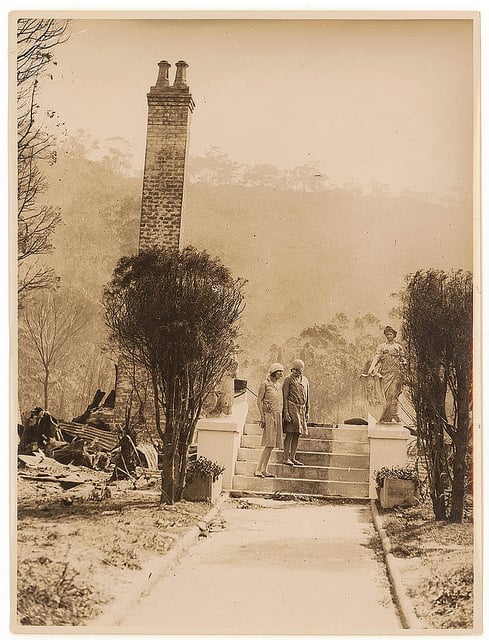
HILOBROW is pleased to present the twelfth installment of our serialization of J.D. Beresford’s Goslings (also known as A World of Women). New installments will appear each Friday for 23 weeks.
When a plague kills off most of England’s male population, the proper bourgeois Mr. Gosling abandons his family for a life of lechery. His daughters — who have never been permitted to learn self-reliance — in turn escape London for the countryside, where they find meaningful roles in a female-dominated agricultural commune. That is, until the Goslings’ idyll is threatened by their elders’ prejudices about free love!
J.D. Beresford’s friend the poet and novelist Walter de la Mare consulted on Goslings, which was first published in 1913. In May 2013, HiLoBooks will publish a beautiful new edition of the book. “A fantastic commentary upon life,” wrote W.L. George in The Bookman (1914). “Mr. Beresford possesses the rare gift of divination,” wrote The Living Age (1916). “It is piece of the most vivid imaginative realism, as well as a challenge to our vaunted civilization.” “At once a postapocalyptic adventure, a comedy of manners, and a tract on sexual and social equality, Goslings is by turns funny, horrifying, and politically stirring,” says Benjamin Kunkel in a blurb for HiLoBooks. “Most remarkable of all may be that it has not yet been recognized as a classic.”
SUBSCRIBE to HILOBROW’s serialized fiction via RSS.
ALL EXCERPTS: 1 | 2 | 3 | 4 | 5 | 6 | 7 | 8 | 9 | 10 | 11 | 12 | 13 | 14 | 15 | 16 | 17 | 18 | 19 | 20 | 21 | 22 | 23
2
Mrs Gosling was a source of trouble from the outset. She had lived her life indoors. In the Wisteria Grove days, she never spent two hours of the twenty-four out of the house. Some times for a whole week she had not gone out at all. It was a mark of their rise in the world that all the tradesmen called for orders. She had found little necessity to buy in shops during recent years. And so, very surely, she had grown more and more limited in her outlook. Her attention had become concentrated on the duties of the housewife. She had not kept any servant, a charwoman who came for a few hours three times a week had done all that the mistress of the house had not dared, in face of neighbourly criticism in her position she could not be seen washing down the little tiled path to the gate nor whitening the steps.
The effect of this cramped existence on Mrs Gosling would not have been noticeable under the old conditions. She had become a specialized creature, admirably adapted to her place in the old scheme of civilization. No demand was ever made upon her resources other than those familiar demands which she was so perfectly educated to supply. Even when the plague had come, she had not been compelled to alter her mode of life. She had made trouble enough about the lack of many things she had once believed to be necessary — familiar foods, soap and the thousand little conveniences that the twentieth century inventor had patented to assist the domestic economy of the small householder; but the trouble was not too great to be overcome. The adaptability required from her was within the scope of her specialized vision. She could learn to do without flour, butter, lard, milk, sugar and the other things, but she could not learn to think on unfamiliar lines.
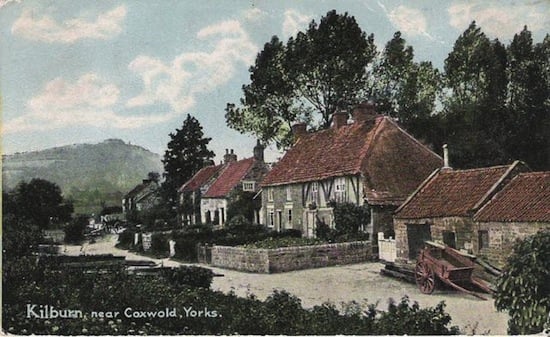
That was the essence of her trouble. She was divorced from a permanent home. She was asked to walk long miles in the open air. Worst of all, she was called upon for initiative, ingenuity; she was required to exercise her imagination in order to solve a problem with which she was quite unfamiliar. She was expected to develop the potentialities of the wild thing, and to extort food from Nature. The whole problem was beyond her comprehension.
The sight of Kilburn was a great blow to her. She had hoped against hope that here, at least, she would find some semblance of the life she had known. It had seemed so impossible to her that Aiken, the butcher’s, or Hobb’s, the grocer’s, would not be open as usual, and the vision of those two desolated and ransacked shops the latter with but a few murderous spears of plate-glass left in its once magnificent windows depressed her to tears.
So shaken was she by the sight of these horrors that Blanche and Millie raised no objection to sleeping that night in the house in Wisteria Grove. Indeed, the two girls were almost tired out, although it was yet early in the afternoon. The truck had become very heavy in the course of the last two miles; and they had had considerable difficulty in negotiating the hill by Westbourne Park Station.
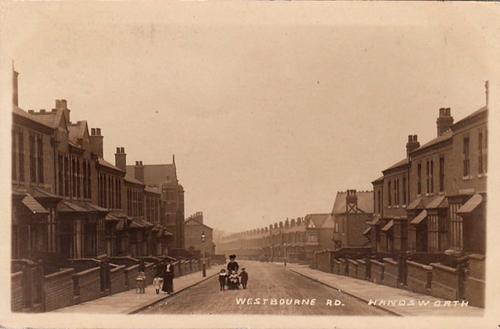
Mrs Gosling was still weeping as she let herself in to her old home, and she wept as she prowled about the familiar rooms and noted the dust which had fallen like snow on every surface which would support it. And for the first time the loss of her husband came home to her. She had been almost glad when he had vanished from the Putney house in that place she had only seen him in his new character of tyrant. Here, among familiar associations, she recalled the fact that he had been a respectable, complacent, hard-working, successful man who had never given her cause for trouble, a man who did not drink nor run after other women, who held a position in the Church and was looked up to by the neighbourhood. According to her definition he had certainly been an ideal husband. It is true that they had dropped any pretence of being in love with one another after Blanche was born, but that was only natural.
Mrs Gosling sat on the bed she had shared with him so long and hoped he was happy. He was; but if she could have seen the nature of his happiness the sight would have given her no comfort. Vaguely she pictured him in some strange Paradise, built upon those conceptions of the mediaeval artists, mainly Italians, which have supplied the ideals of the orthodox. She saw an imperfectly transfigured and still fleshly George Gosling, who did unaccustomed things with a harp, was dressed in exotic garments and was on terms with certain hybrids, largely woman but partly bird, who were clearly recognizable as the angelic host. If she had been a Mohammedan, her vision would have accorded far more nearly with the fact.
3
The successful animal is that which is adapted to its circumstances. Herbert Spencer would appear foolish and incapable in the society of the young wits who frequent the private bar; he might be described by them as an old Johnny who knew nothing about life. Mrs Gosling in her own home had been a ruler; she had had authority over her daughters, and, despite the usual evidences of girlish precocity, she had always been mistress of the situation. In the affairs of household management she was facile princeps, and she commanded the respect accorded to the eminent in any form of specialized activity. But even on this second morning of their emigration it became clear to Blanche that her mother had ceased to rule, and must become a subordinate. A certain respect was due to her in her parental relation, but if she could not be coaxed she must be coerced.
“She’ll be better when we get her right away from here,” was Blanche’s diagnosis, and Millie, who had also achieved some partial realization of the necessities imposed by the new conditions, nodded in agreement.
“She wants to stop here altogether, and, of course, we can’t,” she said.
“We shall starve if we do,” said Blanche.

From that time Mrs Gosling dropped into the humiliating position of a kind of mental incapable who must be humoured into obedience.
The first, and in many ways the most difficult, task was to persuade her away from Kilburn. She clung desperately to that stronghold of her old life.
“I’m too old to change at my age,” she protested, and when the alternative was clearly put before her, she accepted it with a flaccidity that was as aggravating as it was unfightable.
“I’d sooner die ’ere,” said Mrs Gosling, “than go trapesing about the fields lookin’ for somethin’ to eat. I simply couldn’t do it. It’s different for you two gels, no doubt. You go and leave me ’ere.”
Millie might have been tempted to take her mother at her word, but Blanche never for a moment entertained the idea of leaving her mother behind.
“Very well, mother,” she said, desperately, “if you won’t come we must all stop here and starve, I suppose. We’ve got enough food to last a fortnight or so.”
As she spoke she looked out of the window of that little suburban house, and for the first time in her life a thought came to her of the strangeness of preferring such an inconvenient little box to the adventure of the wider spaces of open country. Outside, the sun was shining brilliantly, but the windows were dim with dust and cobwebs.
Yet her mother was comparatively happy in this hovel; she would find delight in cleaning it, although there was no one to appraise the result of her effort. She was a specialized animal with habits precisely analogous to the instincts of other animals and insects. There were insects who could only live in filth and would die miserably if removed from their natural surroundings. Mrs Gosling was a suburban-house insect who would perish in the open air. After all, the chief difference between insects and men is that the insect is born perfectly adapted to its specialized existence, man finds, or is forced into, a place in the scheme after he has come to maturity….
“I can’t see why you shouldn’t leave me behind,” pleaded Mrs Gosling.
“Well, we won’t,” replied Blanche, still looking out of the window.
“It’s wicked of you to make us stop here and starve,” put in Millie. “And even you must see that we shall starve.”
Mrs Gosling wept feebly. She had wept much during the past twenty-four hours. “Where can we go?” she wailed.
“There’s country on the other side of Harrow,” said Blanche.
The thought of Harrow or Timbuctoo was equally repugnant to Mrs Gosling.
Then Millie had an idea. “Well, we only brought four bottles of water with us,” she said, “where are we going to get any more in Kilburn?”
Mrs Gosling racked her brain in the effort to remember some convenient stream in the neighbourhood. “It may rain,” she said feebly at last.
Blanche turned from the window and pointed to the blurred prospect of sunlit street. “We might be dead before the rain came,” she said.
They wore her out in the end.
4
With Harrow as an immediate objective, they toiled up Willesden Lane with their hand-cart early the next morning. Blanche took that route because it was familiar to her, and after passing Willesden Green, she followed the tram lines.
As they got away from London they came upon evidences of the exodus which had preceded them. Bodies of women, for the most part no longer maladorous, were not infrequent, and pieces of household furniture, parcels of clothing, boxes, trunks and smaller impedimenta lay by the roadside, the superfluities of earlier loads that had been lightened, however reluctantly.
Mrs Gosling blenched at the sight of every body — only a few of them could be described as skeletons — and protested that they were all going to their death, but Blanche kept on resolutely with a white, set face, and as Millie followed her example, if with rather less show of temerity, there was no choice but to follow. When the gradients were favourable the girls helped their mother on to the truck and gave her a lift. She was a feeble walker.
Not till they reached Sudbury did they see another living being of their own species, or any sign of human habitation in the long rows of dirty houses.
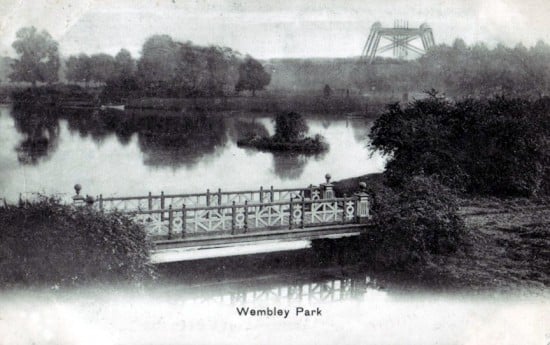
The great surge of migration had spread out from the centre and become absorbed in circles of ever-widening amplitude. The great entity of London had eaten its way so far outwards into arable and pasturage that within a ten-mile radius from Charing Cross not a thousand women could be found who had been able to obtain any promise of security from the products of the soil. And although there were great open spaces of land, such as Wembley Park, which had to be crossed in the journey outwards, the exiles had been unable to wait until such time as seed could be transformed into food by the alchemy of Nature. So the pressure had been continually outwards, forcing the emigrants toward the more distant farms where some fraction of them, at least, might find work and food until the coming of the harvest. In Kent, vegetables were comparatively plentiful. In Northern Middlesex and Buckinghamshire the majority had to depend upon animal food. But in all the Home Counties and in the neighbourhood of every large town, famine was following hard upon the heels of the plague, and 70 per cent of the town-dwelling women and children who had escaped the latter visitation died of starvation and exposure before the middle of August.
In the first inner ring, still sparsely populated, were to be found those who had had vegetable gardens and had been vigorous enough to protect themselves against the flood of migration which had swept up against them.
It was the first signs of this inner ring that the Goslings discovered at Sudbury.
5
They came upon a little row of cottages, standing back a few yards from the road. All three women had been engaged in pushing their trolly up an ascent, and with heads down, and all their physical energies concentrated upon their task, they did not notice the startling difference between these cottages and other houses they had passed, until they stopped to take breath at the summit of the hill.
Mrs Gosling had immediately seated herself upon the sloping pole of the trolly handle. She was breathing heavily and had her hands pressed to her sides. Millie leaned against the side of the trolly, her eyes still on the ground. But Blanche had thrown back her shoulders and opened her lungs, and she saw the banner of smoke that flew from the middle of the three chimney-stacks smoke, in this wilderness, smoke the sign of human life! To Blanche it seemed the fulfilment of a great hope. She had begun to wonder if all the world were dead.
“Oh!” she gasped. “Look!”
They looked without eagerness, anticipating some familiar horror.
“Ooh!” echoed Millie, when she, too, had recognized the harbinger. But Mrs Gosling did not raise her eyes high enough.
“What?” she asked stupidly.
“There’s some one living in that cottage,” said Blanche, and pointed upwards to the soaring pennant.
Mrs Gosling’s face brightened. “Well, to be sure,” she said, “I wonder if they’d let me sit down and rest for a few minutes? And perhaps they might be willing to sell me a glass of milk. I’m sure I’d pay a good price for it.”
“We can see, anyway,” replied Millie, and they roused themselves and pushed on eagerly. The cottage was not more than thirty yards away.
Before they reached it, a woman came to the doorway, stared at them for a moment and then came down to the little wooden gate.
She was a thick-set woman of fifty or so, with iron grey hair cut close to her head. She wore a tweed skirt which did not reach the tops of her heavily soled, high boots. She looked capable, energetic and muscular. And in her hand she carried about three feet of stout broomstick.
She did not speak until the little procession halted before her gate, and then she pointed meaningly up the road with her broomstick and said: “Go on. You can’t stop here.” She spoke with the voice and inflection of an educated woman.
Blanche paused in the act of setting down the trolly handle. Mrs Gosling and Millie stared in amazement; they had been prepared to weep on the neck of this human friend, found at last in the awful desert of Middlesex.
“We only wanted to buy a little milk,” stammered Blanche, no less astonished than her mother and sister.
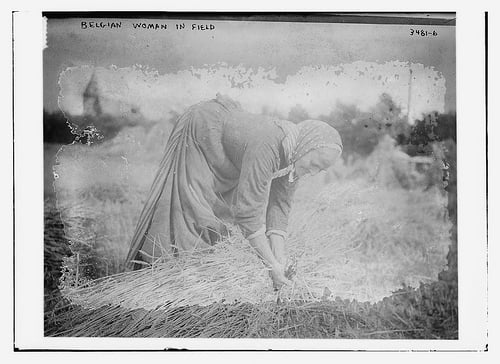
The big woman looked them over with something of pity and contempt. “I can see you’re not dangerous,” she sneered and crossed her great bare forearms over the top of the gate. “Only three poor feckless idiots going begging.”
“We’re not begging,” retorted Blanche. “We’ve got money and we’re willing to pay.”
“Money!” repeated the woman. She looked up at the sky and nodded her head, as though beseeching pity for these feeble creatures. “My dear girl,” she went on, “what do you suppose is the good of money in this world? You can’t eat money, nor wear it, nor use it to light a fire. Now, if you’d offered me a box of matches, you should have had all the milk I can spare.”
“Well, I never,” put in Mrs Gosling, who had feebly come to rest again on the handle of the trolly.
“No, my good woman, you never did,” said the stranger. “You never could and I should say the chances are that you never will.”
Millie was intimidated and shrinking, even Blanche looked a little nervous, but Mrs Gosling was incapable of feeling fear of a fellow-woman. “You can’t mean as you won’t sell us a glass of milk?” she said.
“Have you got a box of matches you’ll exchange for it?” asked the stranger. “I’ve got a burning glass I stole in Harrow, but you can’t depend on the sun.”
“No, nor ’aven’t ’ad, the last three weeks,” said Mrs Gosling. “But if you’ve more money a’ready than you know what to do with, I should ’ave thought as you’d ’a been willing to spare a glass o’ milk for charity’s sake.”
The stranger regarded her petitioner with a hard smile. “Charity’s sake?” she said. “Do you realize that I’ve had to defend this place like a fort against thousands of your sort? I’ve killed three mad women who fought me for possession and buried ’em in the orchard like cats. I held out through the first rush and I can hold out now easily enough. You three are the first I’ve seen for a month, and before that they’d begun to get weak and poor. These are your daughters, I suppose, and the three of you had always depended upon some fool of a man to keep you. Yes? Well, you deserve all you’ve got. Now you can start and do a little healthy, useful work for yourselves. I’ve no pity for you. I’ve got a damned fool of a sister and an old fool of a mother to keep in there,” she pointed to the cottage with her broomstick. “Parasitic like you, both of ’em, and pretty well all the use they are is to keep the fire alight. No, my good woman, you get no charity from me.”
When she had finished her speech, which she delivered with a fluency and point that suggested familiarity with the platform, the stranger crossed her arms again over the gate and stared Mrs Gosling out of countenance.
“Come along, my dears,” said that outraged lady, getting wearily to her feet. “I wouldn’t wish your ears soiled by such language from a woman as ’as forgotten the manners of a lady. But, there, poor thing, I’ve no doubt ’er ’ead’s been turned with all this trouble.”
The stranger smiled grimly and made no reply, but as the Goslings were moving away, she called out to them suddenly: “Hi! You! There’s a witless creature along the road who’ll probably help you. The house is up a side road. Bear round to the right.”
“What a beast,” muttered Blanche when they had gone on a few yards.
“One o’ them ‘new’ women, my dear,” panted Mrs Gosling, who remembered the beginning of the movement and still clung to the old terminology. ’Orrible unsexed creatures! I remember how your poor father used to ’ate ’em.”
“I’d like to get even with her,” said Millie.
They bore to the right, and so avoided two turnings which led up repulsive-looking hills, but they missed the side road.
“I’m sure we must have passed it,” complained Mrs Gosling at last. Her sighs had been increasing in volume and poignancy for the past half-mile, and the prospect of uninhabited country which lay immediately around her she found infinitely dispiriting.
“There isn’t an ’ouse in sight,” she added, “and I really don’t believe I can walk much farther.”
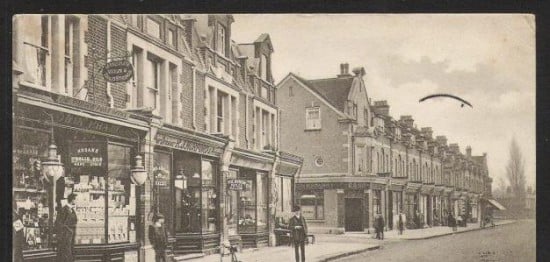
Blanche stopped and looked over the fields on her right towards London. In the distance, blurred by an oily wriggle of heat haze, she could see the last wave of suburban villas which had broken upon this shore of open country. They had left the town behind them at last, but they had not found what they sought. This little arm of land which cut off Harrow and Wealdstone from the mother lake of London had not offered sufficient temptation to delay their forerunners in the search for food. Most of them, with a true instinct for what they sought, had followed the main road into the Chiltern Hills, and those who for some cause or another had wandered into this side track had pushed on, even as Blanche and Millie would have done had they not been dragged back by their mother’s complaints.
The sun was falling a little towards the west, and bird and animal life, which had seemed to rest during the intenser heat of mid-day, was stirring and calling all about them. A rabbit lolloped into the road, a few yards away, pricked up its ears,stared for an instant, and then scuttled to cover. A blackbird flew out of the hedge and fled chattering up the ditch. The air was murmurous with the hum of innumerable insects, and above Mrs Gosling’s head hovered a group of flies which ever and again bobbed down as if following some concerted plan of action, and tried to settle on the poor woman’s heated face.
“Oh! get away, do!” she panted, and flapped a futile handkerchief.
“How quiet it is!” said Blanche; and although the air was full of sound it did indeed appear that a great hush had fallen over the earth. No motor-horn threateningly bellowed its automatic demand for right of way; there was no echo of hoofs nor grind of wheels; no call of children’s voices, nor even the bark of a dog. The wild things had the place to themselves again, and the sound of their movements called for no response from civilized minds. The ears of the Goslings heard, but did not note these, to them, useless evidences of life. They were straining and alert for the voice of humanity.
“I don’t know when I’ve felt the ’eat so much,” said Mrs Gosling suddenly, and Blanche and Millie both started.
“Hush!” said Blanche, and held up a warning finger.
In the distance they heard a sound like the closing of a gate, and then, very clear and small, a feminine voice. ‘Chuck! chuck! chuck!” it said. “Chuck! chuck! chuck!!!”
“I told you we’d passed it,” said Mrs Gosling triumphantly. They turned the trolly and began to retrace their footsteps. Their eager eyes tried to peer through the spinney of trees which shut them off from the south. Once or twice they stopped to listen. The voice was fainter now, but they could hear the squawk of greedily competitive fowls.
RADIUM AGE SCIENCE FICTION: “Radium Age” is HILOBROW’s name for the 1904–33 era, which saw the discovery of radioactivity, the revelation that matter itself is constantly in movement — a fitting metaphor for the first decades of the 20th century, during which old scientific, religious, political, and social certainties were shattered. This era also saw the publication of genre-shattering writing by Edgar Rice Burroughs, Sax Rohmer, E.E. “Doc” Smith, Jack London, Arthur Conan Doyle, Aldous Huxley, Olaf Stapledon, Karel Čapek, H.P. Lovecraft, Charlotte Perkins Gilman, Yevgeny Zamyatin, Philip Gordon Wylie, and other pioneers of post-Verne/Wells, pre-Golden Age “science fiction.” More info here.
HILOBOOKS: The mission of HiLoBooks is to serialize novels on HiLobrow; and also, as of 2012, operating as an imprint of Richard Nash’s Cursor, to reissue Radium Age science fiction in beautiful new print editions. So far, we have published Jack London’s The Scarlet Plague, Rudyard Kipling’s With the Night Mail (and “As Easy as A.B.C.”), Arthur Conan Doyle’s The Poison Belt, H. Rider Haggard’s When the World Shook, Edward Shanks’s The People of the Ruins, William Hope Hodgson’s The Night Land, and J.D. Beresford’s Goslings. Forthcoming: E.V. Odle’s The Clockwork Man, Cicely Hamilton’s Theodore Savage, and Muriel Jaeger’s The Man with Six Senses. For more information, visit the HiLoBooks homepage.
SERIALIZED BY HILOBOOKS: Jack London’s The Scarlet Plague | Rudyard Kipling’s With the Night Mail (and “As Easy as A.B.C.”) | Arthur Conan Doyle’s The Poison Belt | H. Rider Haggard’s When the World Shook | Edward Shanks’ The People of the Ruins | William Hope Hodgson’s The Night Land | J.D. Beresford’s Goslings | E.V. Odle’s The Clockwork Man | Cicely Hamilton’s Theodore Savage | Muriel Jaeger’s The Man With Six Senses | Jack London’s “The Red One” | Philip Francis Nowlan’s Armageddon 2419 A.D. | Homer Eon Flint’s The Devolutionist | W.E.B. DuBois’s “The Comet” | Edgar Rice Burroughs’s The Moon Men | Charlotte Perkins Gilman’s Herland | Sax Rohmer’s “The Zayat Kiss” | Eimar O’Duffy’s King Goshawk and the Birds | Frances Hodgson Burnett’s The Lost Prince | Morley Roberts’s The Fugitives | Helen MacInnes’s The Unconquerable | Geoffrey Household’s Watcher in the Shadows | William Haggard’s The High Wire | Hammond Innes’s Air Bridge | James Branch Cabell’s Jurgen | John Buchan’s “No Man’s Land” | John Russell’s “The Fourth Man” | E.M. Forster’s “The Machine Stops” | John Buchan’s Huntingtower | Arthur Conan Doyle’s When the World Screamed | Victor Bridges’ A Rogue By Compulsion | Jack London’s The Iron Heel | H. De Vere Stacpoole’s The Man Who Lost Himself | P.G. Wodehouse’s Leave It to Psmith | Richard Connell’s “The Most Dangerous Game” | Houdini and Lovecraft’s “Imprisoned with the Pharaohs” | Arthur Conan Doyle’s “The Sussex Vampire.”
ORIGINAL FICTION: HILOBROW has serialized three novels: James Parker’s The Ballad of Cocky The Fox (“a proof-of-concept that serialization can work on the Internet” — The Atlantic); Karinne Keithley Syers’s Linda Linda Linda (which includes original music); and Robert Waldron’s roman à clef The School on the Fens. We also publish original stories and comics. These include: Matthew Battles’s stories “Gita Nova“, “Makes the Man,” “Imago,” “Camera Lucida,” “A Simple Message”, “Children of the Volcano”, “The Gnomon”, “Billable Memories”, “For Provisional Description of Superficial Features”, “The Dogs in the Trees”, “The Sovereignties of Invention”, and “Survivor: The Island of Dr. Moreau”; several of these later appeared in the collection The Sovereignties of Invention | Peggy Nelson’s “Mood Indigo“, “Top Kill Fail“, and “Mercerism” | Annalee Newitz’s “The Great Oxygen Race” | Flourish Klink’s Star Trek fanfic “Conference Comms” | Charlie Mitchell’s “A Fantasy Land” | Charlie Mitchell’s “Sentinels” | Joshua Glenn’s “The Lawless One”, and the mashup story “Zarathustra vs. Swamp Thing” | Adam McGovern and Paolo Leandri’s Idoru Jones comics | John Holbo’s “Sugarplum Squeampunk” | “Another Corporate Death” (1) and “Another Corporate Death” (2) by Mike Fleisch | Kathryn Kuitenbrouwer and Frank Fiorentino’s graphic novel “The Song of Otto” (excerpt) | John Holbo’s graphic novel On Beyond Zarathustra (excerpt) | “Manoj” and “Josh” by Vijay Balakrishnan | “Verge” by Chris Rossi, and his audio novel Low Priority Hero | EPIC WINS: THE ILIAD (1.408-415) by Flourish Klink | EPIC WINS: THE KALEVALA (3.1-278) by James Parker | EPIC WINS: THE ARGONAUTICA (2.815-834) by Joshua Glenn | EPIC WINS: THE MYTH OF THE ELK by Matthew Battles | TROUBLED SUPERHUMAN CONTEST: Charles Pappas, “The Law” | CATASTROPHE CONTEST: Timothy Raymond, “Hem and the Flood” | TELEPATHY CONTEST: Rachel Ellis Adams, “Fatima, Can You Hear Me?” | OIL SPILL CONTEST: A.E. Smith, “Sound Thinking | LITTLE NEMO CAPTION CONTEST: Joe Lyons, “Necronomicon” | SPOOKY-KOOKY CONTEST: Tucker Cummings, “Well Marbled” | INVENT-A-HERO CONTEST: TG Gibbon, “The Firefly” | FANFICTION CONTEST: Lyette Mercier’s “Sex and the Single Superhero”
